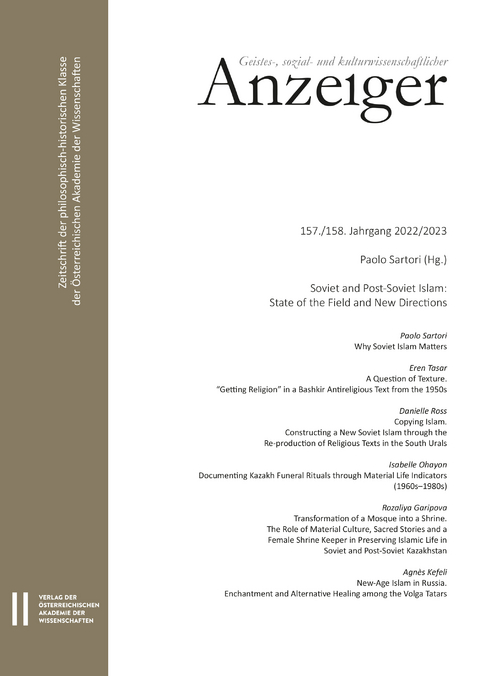
Geistes-, sozial- und kulturwissenschaftlicher Anzeiger — Zeitschrift der philosophisch-historischen Klasse der Österreichischen Akademie der Wissenschaften, 157./158. Jahrgang (2022/2023)
Seiten
2023
|
1. Auflage
Verlag der österreichischen Akademie der Wissenschaften
978-3-7001-9447-7 (ISBN)
Verlag der österreichischen Akademie der Wissenschaften
978-3-7001-9447-7 (ISBN)
- Titel nicht im Sortiment
- Artikel merken
“Why study Soviet Islam in the first place?”, or “is Soviet Islam at all significant?” These are of course legitimate questions, for when studying the history of the Muslim world, the USSR is most certainly not the first place that comes to mind. We have tended in the past to think of the USSR as an atheist space where religion barely survived radical policies of modernization and social engineering. Even if it was indeed the case that the USSR devoted massive resources to eliminate religion, the Party-state nevertheless defended the notion of freedom of conscience enshrined in the Soviet constitution, a notion which offered citizens of all walks of life a normative framework allowing for an engagement with religion. This theme issue of the Anzeiger sheds light on life stories of Soviet citizens who pursued a path to attain self-perfection, a trajectory in pursuit of belief, temperance, and dignity, which was deeply informed by Islamic discursive practices. Taken together, these stories can be read as an epic and tragic narrative of resilience, resistance and subversion. Equally, they open up a new field of historical research for those who are interested in peeling away the layers of the Soviet civilization and discovering the various ways in which Soviet citizens fashioned themselves as Muslims. How and why did they commit themselves to uphold Islam in a violently secularist environment? And how did the Soviet state cope with Muslims’ forceful articulation of their faith? The notion that in the eyes of many Soviet citizens the USSR was an abode of Islam forms the framing device of this thematic issue of the Anzeiger – a device that helps us to think about how the atheist project of the Soviet empire ultimately failed, but also how it simultaneously helped shape the range of meanings of Muslimness under Soviet rule and in the first decade after the dissolution of the Soviet Union. “Why study Soviet Islam in the first place?”, or “is Soviet Islam at all significant?” These are of course legitimate questions, for when studying the history of the Muslim world, the USSR is most certainly not the first place that comes to mind. We have tended in the past to think of the USSR as an atheist space where religion barely survived radical policies of modernization and social engineering. Even if it was indeed the case that the USSR devoted massive resources to eliminate religion, the Party-state nevertheless defended the notion of freedom of conscience enshrined in the Soviet constitution, a notion which offered citizens of all walks of life a normative framework allowing for an engagement with religion. This theme issue of the Anzeiger sheds light on life stories of Soviet citizens who pursued a path to attain self-perfection, a trajectory in pursuit of belief, temperance, and dignity, which was deeply informed by Islamic discursive practices. Taken together, these stories can be read as an epic and tragic narrative of resilience, resistance and subversion. Equally, they open up a new field of historical research for those who are interested in peeling away the layers of the Soviet civilization and discovering the various ways in which Soviet citizens fashioned themselves as Muslims. How and why did they commit themselves to uphold Islam in a violently secularist environment? And how did the Soviet state cope with Muslims’ forceful articulation of their faith? The notion that in the eyes of many Soviet citizens the USSR was an abode of Islam forms the framing device of this thematic issue of the Anzeiger – a device that helps us to think about how the atheist project of the Soviet empire ultimately failed, but also how it simultaneously helped shape the range of meanings of Muslimness under Soviet rule and in the first decade after the dissolution of the Soviet Union.
| Erscheinungsdatum | 21.09.2023 |
|---|---|
| Reihe/Serie | Geistes-, sozial-und kulturhistiorischer Anzeiger (vormals nur "Anzeiger) der ÖAW ; 157 |
| Verlagsort | Wien |
| Sprache | deutsch |
| Maße | 170 x 240 mm |
| Gewicht | 360 g |
| Einbandart | Englisch Broschur |
| Themenwelt | Sachbuch/Ratgeber ► Geschichte / Politik ► Allgemeines / Lexika |
| Geschichte ► Teilgebiete der Geschichte ► Kulturgeschichte | |
| Geisteswissenschaften ► Religion / Theologie ► Islam | |
| Sozialwissenschaften | |
| Schlagworte | Akademie der Wissenschaften • Anzeiger • Geistes-, sozial- und kulturwissenschaftlicher Anzeiger (vormals "Anzeiger der philosophisch-histori |
| ISBN-10 | 3-7001-9447-1 / 3700194471 |
| ISBN-13 | 978-3-7001-9447-7 / 9783700194477 |
| Zustand | Neuware |
| Haben Sie eine Frage zum Produkt? |
Mehr entdecken
aus dem Bereich
aus dem Bereich
der stille Abschied vom bäuerlichen Leben in Deutschland
Buch | Hardcover (2023)
C.H.Beck (Verlag)
23,00 €
vom Mittelalter bis zur Gegenwart
Buch | Softcover (2024)
C.H.Beck (Verlag)
12,00 €
eine Geschichte der Welt in 99 Obsessionen
Buch | Hardcover (2023)
Klett-Cotta (Verlag)
22,00 €


